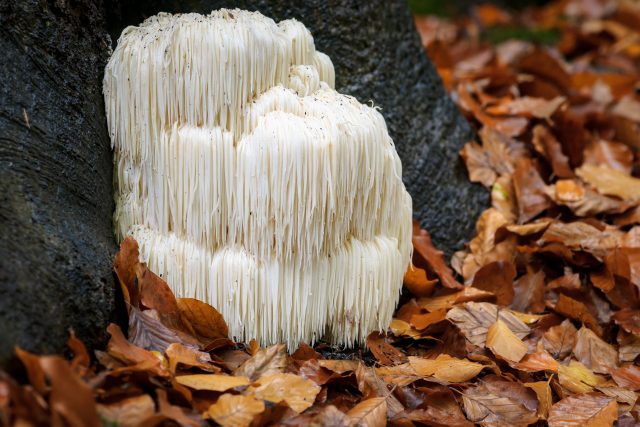
Lion’s mane mushroom has been used in Eastern medicine since antiquity. An edible member of the tooth fungus group, it has been revered in China for its alleged benefits surrounding gut and spleen health, cancer prevention and more. Buddhist monks in Japan called it yamabushitake and took it to increase focus for meditation.
In the last decade, numerous studies have shown lion’s mane can improve a person’s memory, neural health and brain function. Some evidence even suggests it can help fight off neural degeneration diseases like Alzheimer’s and dementia by regrowing nerve endings.
Lion’s mane is not psychedelic. But it does have a lot of similarities to psilocybin fungi when it comes to neurological health. As research is starting to show, both of these fungi have similar properties in that regard. They may even enhance one another’s benefits when taken together, according to Paul Stamets, one of the world’s leading mycologists and psychedelic advocates.
“[Lion’s mane] is very likely going to come right to the forefront, in terms of preserving mental agility,” Stamets says.
Stamets has been studying mushrooms his entire adult life. He took psilocybin mushrooms for the first time when he was 18, and ate more than he’d intended to; he ended up climbing a tree and tripping through a thunderstorm for hours. He says it was a profound experience that sparked a lifelong passion and curiosity in mushrooms of all kinds.
A guest speaker at Denver’s recent Psychedelic Science Conference 2023, Stamets believes “stacking” lion’s mane with vitamin B3 and psychedelic mushrooms can actually increase psilocybin’s depression- and anxiety-treating effects.
“We’re at the very beginning of a mycological revolution in biomedicine,” Stamets says.
Among numerous scientific studies published on lion’s mane, one from 2013 was a landmark. Appearing in the International Journal of Medicinal Mushrooms, this study examined the neurotrophic effects of lion’s mane on the human brain. Specifically, it looked at how the fungi affected the neural growth factors (NGF) of a specific brain cell, neuroblastoma-glioma cell NG108-15. It concluded that lion’s mane “can induce NGF synthesis in nerve cells” and “had neurotrophic but not neuroprotective activities.”
A more recent study published in January 2023 in the Journal of Neurochemistry found that mice fed with lion’s mane extract “exhibited increased neurotrophin expression and downstream signaling, resulting in significantly enhanced hippocampal memory. [Lion’s mane], therefore, acts through a novel pan-neurotrophic signaling pathway, leading to improved cognitive performance.”
Similarly, recent research has shown that psilocybin mushrooms promote structural and functional neural plasticity in humans. That 2018 study, published in the journal Neuroscience, says “serotonergic psychedelics are capable of robustly increasing neuritogenesis and/or spinogenesis.” The researchers observed that those changes in neuronal structure were also accompanied by increased synapse number and function.
Stamets believes that by “stacking” lion’s mane, psilocybin and niacin (vitamin B3) it’s possible to increase the potential health and wellness benefits of both mushrooms. According to Stamets, the niacin helps to more effectively distribute lion’s mane and psilocybin into the brain and enhances their neurogenic effects.
Dose-wise, Stamets recommends taking .1-.2 grams of psilocybin, 500-1000 mg of lion’s mane powder, and 25-50 mg of niacin for four days consecutively, followed by three days of no supplements. This regiment has become known as the “Stamets stack” and is used widely throughout the micro-dosing community.
He likens lion’s mane supplements to a vitamin for your brain — taken daily, on its own, he says it has notable benefits for health, wellness and mood. But adding a microdose of psilocybin and niacin takes those benefits to another level, according to Stamets. He believes that combination has the potential to initiate the “next quantum leap in human consciousness.”














